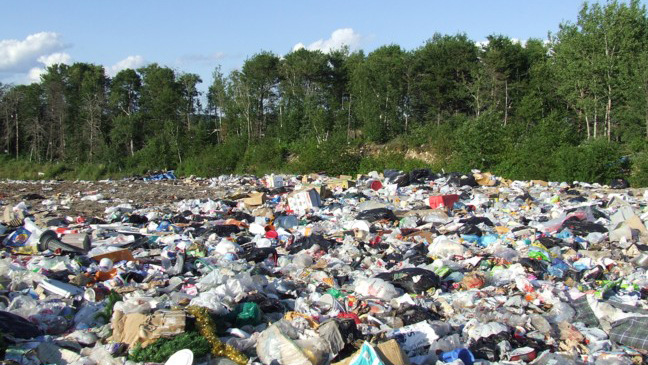
Is this image of a landfill with trees and blue sky a photo of nature? (Michelle Arseneault/Creative Commons)

Is this image of a landfill with trees and blue sky a photo of nature? (Michelle Arseneault/Creative Commons)
This semester I have been cataloguing magazine advertisements as a research assistant for Professor Svoboda in the Sustainability Department at GW. My work for this project involves examining each ad in a magazine for certain green criteria: Does the ad use nature as a backdrop? As argument? Does it demonstrate a specific concern for biodiversity, water, or forestry? These are just some of the many environmental aspects I code for in my position.
But recently we’ve run into a roadblock: How does one define nature? My coworker, boss, and I all have different perspectives on what constitutes “Nature as Backdrop,” in particular, with my reading being very broad and my coworkers’ more discriminate. So, we searched through some recent scholarship on the definition of nature, and suffice it to say that this debate is not exclusive to our work meetings.
In fact, this disagreement of ours is reflective of two key camps on the definition of nature. In my research, I came across two articles whose authors leaned in opposing directions when they discussed the word’s definition. In “On My Mind: The Ecological Explanation for the Environmental Crisis,” Ryder Miller reports that “human beings have been so destructive to the natural world that they have needed to be separated from the rest of the natural world in some definitions of nature” because “we have abilities, such as technology and the ability to purposefully alter our environment on a large scale” (8). This camp is defined by a separation of humanity and human processes from nature.
Conversely, McIsaac and Brun argue that “rather than being unnatural, human culture can also be viewed as a natural behavioral response to environmental challenges” (9). In this reading of the word, humans have developed their intellect through the natural process of evolution and used this knowledge to create technology that can alter the environment dramatically. Even though the earth has never experienced such large-scale changes (changes that are from technology distinct to humans), human manipulations of their environment remain within the definition of nature because of the evolutionary advantage that produced their advanced minds.
Reading our workplace discussion through the lens of this debate, it is clear that the definition of nature I have assumed is more in line with the second camp, while my coworker’s would be closer to the first. One example that highlighted this disagreement was an ad that depicts a landfill. Showing only piles of trash and the sky above them, this landfill struck me as “Nature as Backdrop” because I would imagine the altered environment beneath the trash piles and the organisms that now rummage through them. Additionally, I would make the comparison between our trash and, for example, the discarded acorn tops that a squirrel would toss on the ground: while our materials are human-made and less decomposable, most organisms do produce waste. In my opinion, to distinguish humans too much from other animals is to put a barrier between species that ultimately hinders our respect and attention to them. So, while our trash is worse for the environment, it is more productive to compare (and contrast) it to other species’ than it is to write it off as entirely different.
It is important to note that while this debate on the definition of nature is quite divisive (and contemporary), it evades the scholarly spotlight: In my research, I found few articles explicitly concerned with nature’s definition; instead, many authors either speak peripherally about their views on the word’s proper implications or (more commonly) just assume that their positions are understood by their audiences. It is helpful to keep in mind the shrouded nature of this debate when looking through existing scholarship, and ultimately I see a call on scientific journalists to dedicate some time to writing explicitly about the definition of nature.
—
WORKS CITED